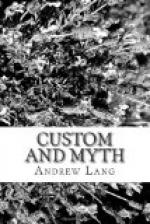{119} Rolland, Faune populaire.
{121} The attempt is not to explain the origin of each separate name but only of the general habit of giving animal or human names stars.
{125} Mr. Herbert Spencer believes that the Australians were once more civilised than at present. But there has never been found a trace of pottery on the Australian continent, which says little for their civilisation in the past.
{128} Brugsch, History of Egypt, i. 32.
{130} Brough Smith.
{131} Amazonian Tortoise Myths, p. 39.
{132a} Sahagun, vii. 3.
{132b} Grimm, D. M., Engl. transl., p. 716.
{133} Hartt, op. cit., p. 40.
{134a} Kaegi, Der Rig Veda, p. 217.
{134b} Mainjo-i-Khard, 49, 22, ed. West.
{134c} Op. cit. p. 98.
{137} Prim. Cult., i. 357.
{140} Lectures on Language, pp. 359, 362.
{144} Grimm, D. M., Engl., Trans. p. 1202.
{145} Tom Sawyer, p. 87.
{146a} Rep. vi. 488. Dem. 10, 6.
{146b} Journal Anthrop. Inst., Feb. 1881.
{147a} Gregor, Folklore of North-east Counties, p, 40.
{147b} Wars of Jews, vii. 6, 3.
{147c} Var. Hist., 14, 27.
{148} Max Muller, Selected Essays, ii. 622.
{151} Myth of Kirke, p. 80.
{152a} Turner’s Samoa.
{152b} Josephus, loc. cit. For this, and many other references, I am indebted to Schwartz’s Prahistorisch-anthropologische Studien. In most magic herbs the learned author recognises thunder and lightning—a theory no less plausible than Mr. Brown’s.
{152c} Lib. xxviii.
{152d} Schoolcraft.
{157a} Talvj, Charakteristik der Volkslieder, p. 3.
{157b} Fauriel, Chants de la Grece moderne.
{160} Thus Scotland scarcely produced any ballads, properly speaking, after the Reformation. The Kirk suppressed the dances to whose motion the ballad was sung in Scotland, as in Greece, Provence, and France.
{161} L. Preller’s Ausgewahlte Aufsatze. Greek ideas on the origin of Man. It is curious that the myth of a gold, a silver, and a copper race occurs in South America. See Brasseur de Bourbourg’s Notes on the Popol Vuh.
{164a} See essay on Early History of the Family.
{164b} This constant struggle may be, and of course by one school of comparative mythologists will be, represented as the strife between light and darkness, the sun’s rays, and the clouds of night, and so on. M. Castren has well pointed out that the struggle has really an historical meaning. Even if the myth be an elementary one, its constructors must have been in the exogamous stage of society.
{169} Sampo may be derived from a Thibetan word, meaning ’fountain of good,’ or it may possibly be connected with the Swedish Stamp, a hand-mill. The talisman is made of all the quaint odds and ends that the Fetichist treasures: swan’s feathers, flocks of wool, and so on.




